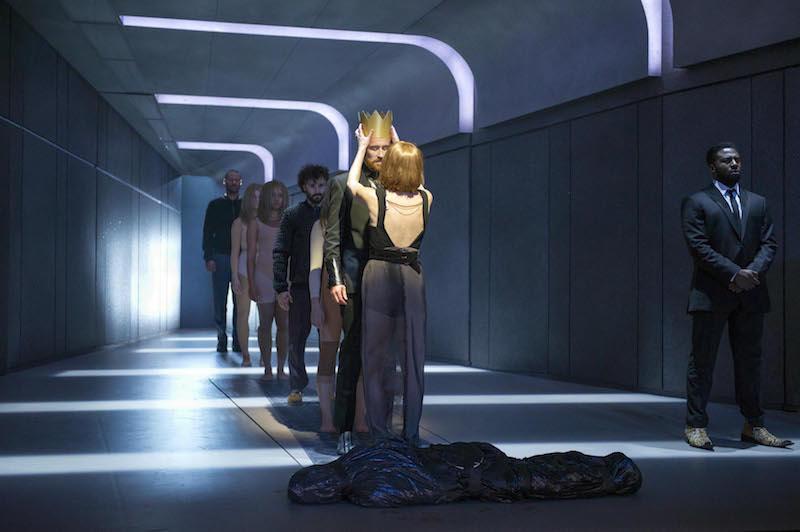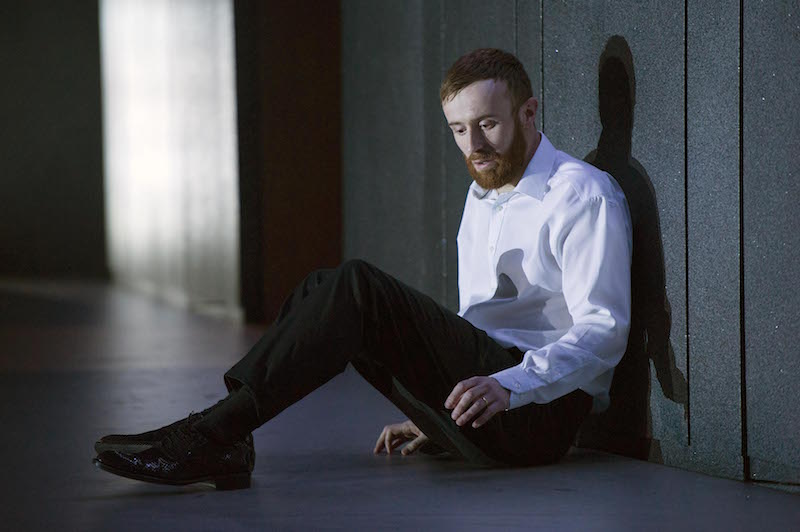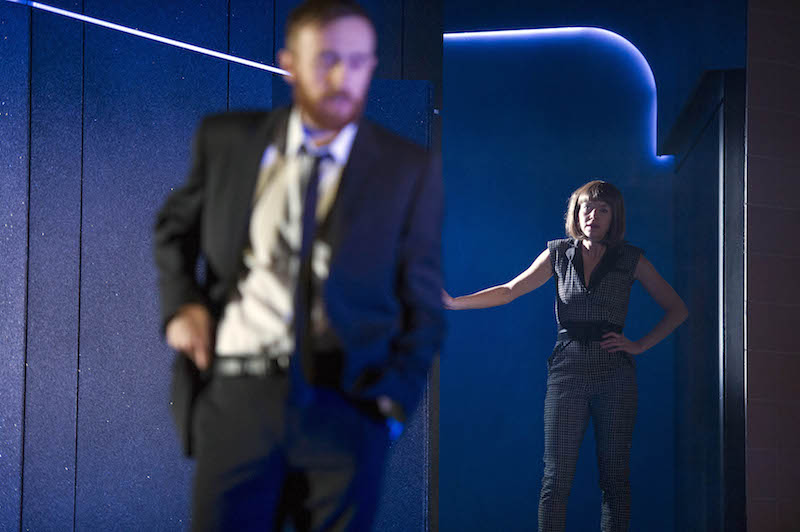Macbeth, Young Vic | reviews, news & interviews
Macbeth, Young Vic
Macbeth, Young Vic
Shakespeare seems ripped from the headlines in a bold new production

Events have overtaken this Macbeth, dramatically heightening its queasy topicality. Not just brutal beheadings and torture, but the cost and collateral damage of conflict without end, and the scourge of a tyrant slaughtering his own people, strike one anew in the wake of recent debate. Carrie Cracknell’s interpretative, modern-dress production traps us in a military underground bunker, drained of light and colour – a Hell as acutely psychological as it is physical.
Cracknell is not in thrall to the text, briskly stripping it back to an economical two hours. Building on their Medea at the National, she and co-director Lucy Guerin give dance equal weight, with the witches’ otherworldly movement spilling into and eventually overwhelming Macbeth’s realm. Yet the action remains grounded, illustrating the usurper’s unravelling mental state – PTSD as communication with the supernatural. Appropriately for this portrait of murky modern warfare, victory is complex, grisly and hollow. Corpses, including those of children, fill the suffocating space, and Macbeth must literally pluck the crown from Duncan’s dead body.
 John Heffernan (pictured right) sensitively tracks Macbeth’s descent into darkness, from reasoned man of dawning ambition to traumatised, isolated paranoiac. His suppression – urged by his wife (Anna Maxwell Martin) as part of a manly façade – leads to uncontrollable outbursts; in contrast, Macduff (Nicholas Burns) takes time to process the tragic loss of his family. “All my pretty ones,” Burns murmurs in heartbreaking bemusement. Interestingly, this Macbeth understands war is fought as much in public perception as on the battlefield, a lesson learned from preening Duncan (also Burns, one obstacle reborn as another), swanning in after the military work is done for a credit-snatching photo op.
John Heffernan (pictured right) sensitively tracks Macbeth’s descent into darkness, from reasoned man of dawning ambition to traumatised, isolated paranoiac. His suppression – urged by his wife (Anna Maxwell Martin) as part of a manly façade – leads to uncontrollable outbursts; in contrast, Macduff (Nicholas Burns) takes time to process the tragic loss of his family. “All my pretty ones,” Burns murmurs in heartbreaking bemusement. Interestingly, this Macbeth understands war is fought as much in public perception as on the battlefield, a lesson learned from preening Duncan (also Burns, one obstacle reborn as another), swanning in after the military work is done for a credit-snatching photo op.
Maxwell Martin (pictured below with Heffernan) is most effective when joining this increasingly desperate charade, urging her distracted husband to keep up appearances, but elsewhere she struggles to root her Lady Macbeth’s drive. It doesn’t help that the speed of her delivery renders every other word inaudible. She does benefit from the addition of dance – in the sleepwalking scene, she chillingly enacts the same movements again and again, trapped in a cycle of perpetual torment. The accusation that “Macbeth does murder sleep” becomes a prophetic curse.
 The weird sisters (Ana Beatriz Meireles, Jessie Oshodi and Clemmie Sveaas) are aptly named, juddering and thrashing in angular unison as they impart fair words from a foul source. Guerin’s striking movement is effective in both echoing and driving the emotional undercurrents, and the juxtaposition of expressive and naturalistic provides sharp humour, but the dance-focussed climax is overlong. It’s anchored, at least, by the sterling contributions of Prasanna Puwanarajah, whose excellent Banquo brims with warmth and intelligence, converted in death to devastating insight.
The weird sisters (Ana Beatriz Meireles, Jessie Oshodi and Clemmie Sveaas) are aptly named, juddering and thrashing in angular unison as they impart fair words from a foul source. Guerin’s striking movement is effective in both echoing and driving the emotional undercurrents, and the juxtaposition of expressive and naturalistic provides sharp humour, but the dance-focussed climax is overlong. It’s anchored, at least, by the sterling contributions of Prasanna Puwanarajah, whose excellent Banquo brims with warmth and intelligence, converted in death to devastating insight.
Lizzie Clachan’s grey tunnel to nowhere is appropriately claustrophobic, and its sliding panels produce memorable tableaux of cold horror – supported by the flashes of Neil Austin’s lighting design. However, the latter also plunges the actors too often into gloom. While Macbeth cries “Let not light see my black and deep desires”, viewers may wish they could see more – details are lost in shadow. In fact, the same could be said for some of the characters’ emotional arcs, occasionally buried beneath rather than realised by stylish ideas. But perhaps that’s Cracknell’s intention for an atmospheric if elliptical journey through the shadows of the soul.
rating
Explore topics
Share this article
Add comment
The future of Arts Journalism
You can stop theartsdesk.com closing!
We urgently need financing to survive. Our fundraising drive has thus far raised £49,000 but we need to reach £100,000 or we will be forced to close. Please contribute here: https://gofund.me/c3f6033d
And if you can forward this information to anyone who might assist, we’d be grateful.

Subscribe to theartsdesk.com
Thank you for continuing to read our work on theartsdesk.com. For unlimited access to every article in its entirety, including our archive of more than 15,000 pieces, we're asking for £5 per month or £40 per year. We feel it's a very good deal, and hope you do too.
To take a subscription now simply click here.
And if you're looking for that extra gift for a friend or family member, why not treat them to a theartsdesk.com gift subscription?
more Theatre
 Troilus and Cressida, Globe Theatre review - a 'problem play' with added problems
Raucous and carnivalesque, but also ugly and incomprehensible
Troilus and Cressida, Globe Theatre review - a 'problem play' with added problems
Raucous and carnivalesque, but also ugly and incomprehensible
 Clarkston, Trafalgar Theatre review - two lads on a road to nowhere
Netflix star, Joe Locke, is the selling point of a production that needs one
Clarkston, Trafalgar Theatre review - two lads on a road to nowhere
Netflix star, Joe Locke, is the selling point of a production that needs one
 Ghost Stories, Peacock Theatre review - spirited staging but short on scares
Impressive spectacle saves an ageing show in an unsuitable venue
Ghost Stories, Peacock Theatre review - spirited staging but short on scares
Impressive spectacle saves an ageing show in an unsuitable venue
 Hamlet, National Theatre review - turning tragedy to comedy is no joke
Hiran Abeyeskera’s childlike prince falls flat in a mixed production
Hamlet, National Theatre review - turning tragedy to comedy is no joke
Hiran Abeyeskera’s childlike prince falls flat in a mixed production
 Rohtko, Barbican review - postmodern meditation on fake and authentic art is less than the sum of its parts
Łukasz Twarkowski's production dazzles without illuminating
Rohtko, Barbican review - postmodern meditation on fake and authentic art is less than the sum of its parts
Łukasz Twarkowski's production dazzles without illuminating
 Lee, Park Theatre review - Lee Krasner looks back on her life as an artist
Informative and interesting, the play's format limits its potential
Lee, Park Theatre review - Lee Krasner looks back on her life as an artist
Informative and interesting, the play's format limits its potential
 Measure for Measure, RSC, Stratford review - 'problem play' has no problem with relevance
Shakespeare, in this adaptation, is at his most perceptive
Measure for Measure, RSC, Stratford review - 'problem play' has no problem with relevance
Shakespeare, in this adaptation, is at his most perceptive
 The Importance of Being Earnest, Noël Coward Theatre review - dazzling and delightful queer fest
West End transfer of National Theatre hit stars Stephen Fry and Olly Alexander
The Importance of Being Earnest, Noël Coward Theatre review - dazzling and delightful queer fest
West End transfer of National Theatre hit stars Stephen Fry and Olly Alexander
 Get Down Tonight, Charing Cross Theatre review - glitz and hits from the 70s
If you love the songs of KC and the Sunshine Band, Please Do Go!
Get Down Tonight, Charing Cross Theatre review - glitz and hits from the 70s
If you love the songs of KC and the Sunshine Band, Please Do Go!
 Punch, Apollo Theatre review - powerful play about the strength of redemption
James Graham's play transfixes the audience at every stage
Punch, Apollo Theatre review - powerful play about the strength of redemption
James Graham's play transfixes the audience at every stage
 The Billionaire Inside Your Head, Hampstead Theatre review - a map of a man with OCD
Will Lord's promising debut burdens a fine cast with too much dialogue
The Billionaire Inside Your Head, Hampstead Theatre review - a map of a man with OCD
Will Lord's promising debut burdens a fine cast with too much dialogue

Comments
What was Anna Maxwell Martin
What was Anna Maxwell Martin up to - gabbling, as you suggest? I expected more from her - and from the production, which I wanted to like as the imaginative antithesis to RSC heritage Shakespeare. But it didn't terrorise after a while. Shame. Heffernan, at least, spoke the verse beautifully.
Enjoyable production though